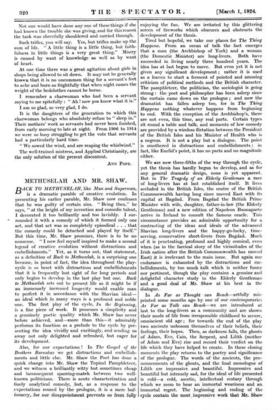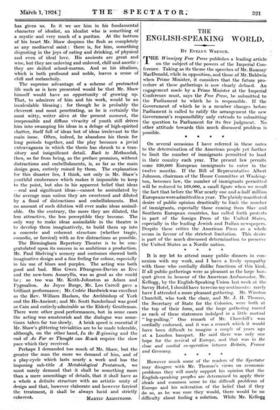METHUSELAH AND MR. SHAW.
RACK TO METHUSELAH, like Man and Superman, is a dramatic parable of creative evolution. In presenting his earlier parable, Mr. Shaw now confesses that he was guilty of certain sins. " Being then," he says, " at the height of my invention and comedic talent, I decorated it too brilliantly and too lavishly. I sur- rounded it with a comedy of which it formed only one act, and that act was so completely episodical . . . that the comedy could be detached and played by itself." But this time, Mr. Shaw promises, there is to be no nonsense. " I now feel myself inspired to make a second legend of creative evolution without distractions and embellishments." Yet, as it turns out, that statement, as a definition of Back to Methuselah, is a surprising one because, in point of fact, the idea throughout the play- cycle is so beset with distractions and embellishments that it is frequently lost sight of for long periods and only begins to develop in the last play but one. Back to Methuselah sets out to present life as it might be if an immensely increased longevity would enable man to perfect it in accordance with the Shavian ideal— an ideal which in_ many ways is a profound and noble one. The first play of the cycle, In the Beginning, is a fine piece of work. It possesses a simplicity and a genuinely poetic quality which Mr. Shaw has never before achieved, and—more than this—it admirably performs its function as a prelude to the cycle by pre- senting the idea vividly and excitingly, and sending us away not only delighted and refreshed, but eager for its development.
Alas, for our expectations ! In The Gospel of the Brothers Barnabas we get distractions and embellish- ments and- little else. Mr. Shaw the Poet has done a quick change into Mr. Shaw the Topical Pamphleteer, and we witness a brilliantly witty but sometimes cheap and inconsequent sparring-match between two well- known politicians.: There is acute characterization and -finely analytical comedy, but, as a response to the expectations roused by the prologue, it is a mere buf- foonery,. for our disappointment prevents _us from fully enjoying the fun. We are irritated by this glittering screen of fireworks which obscures and obstructs the development of the thesis.
Tired but hopeful, we take our places for The Thing Happens. From an ocean of talk the fact emerges that a man (the Archbishop of York) and a woman (the Domestic Minister) are long-livers. Both have succeeded in living nearly three hundred years. The idea has at last begun to move. But even yet it is not given any significant development ; rather it is used as a leaven to start a ferment of pointed and amusing criticism of political methods and the British character. The pamphleteer, the politician, the sociologist is going strong : the poet and philosopher has been asleep since the curtain came down on the prologue ; and now the dramatist has fallen asleep too, for in The Thing Happens nothing whatever happens from beginning to end. With the exception of the Archbishop's, there are not even, this time, any real parts. Certain types sit round a table and talk, and moments of low comedy are provided by a wireless flirtation between the President of the British Isles and his Minister of Health who is a negress. It is not a play but a dialogue. The point is smothered in distractions and embellishments : in fact, like Euclid's point, it has no parts and no magnitude either.
We are now three-fifths of the way through the cycle, yet the thesis has hardly begun to develop, and as for any general dramatic design, none is yet -apparent. But in The Tragedy of. an Elderly Gentleman a race of long-livers has at last established itself. It lives secluded in the British Isles, the centre of the British Commonwealth having long since moved East with its capital at Bagdad. From Bagdad the British Prime Minister with wife, daughter, father-in-law (the Elderly Gentleman) and a new edition of Napoleon Buonaparte arrive in Ireland to consult the famous oracle. This circumstance provides an admirable opportunity for a contrasting of the ideas and ideals of the advanced Shavian long-livers and the happy-go-lucky, time- serving, conservative short-livers from Bagdad. Much of it is penetrating, profound and highly comical, even when (as in the farcical story of the vicissitudes of the Irish nation after the British Commonwealth has moved East) it is irrelevant to the main issue. But again our endurance is exhausted by the distractions and em- bellishments, by too much talk which is neither funny nor pertinent, though the play contains a genuine and delightful character study in the Elderly Gentleman and a good deal of Mr. Shaw at his best in the dialogue.
In As Far as Thought can Reach—artfully mis- printed some months ago by one of our contemporaries As Far as Talk can Reach—we are introduced at last to the long-livers as a community and are shown their mode of life from irresponsible childhood to severe, omniscient old age ; for towards the end of the play two ancients unbosom themselves of their beliefs, their feelings, their hopes. Then, as darkness falls, the ghosts of Adam, Eve, Cain, the Serpent, and Lilith (mother of Adam and Eve) rise and record their verdict on the life which they have helped to create. In these closing moments the play returns_ to the poetry and significance of the prologue. The words of the ancients, the pro- nouncements of the ghosts, and the final monologue of Lilith are impressive and beautiful. Impressive and beautiful but intensely sad, for the ideal of life presented is cold—a cold, ascetic, intellectual ecstasy through which we seem to hear an immortal weariness and an immortal regret. The beginning and ending of the cycle contain the most, impressive work that Mr, Shaw has given us. In it we see him in his fundamental character of idealist, an idealist who is something of a mystic and very much of a puritan. At the bottom of his heart Mr.- Shaw despises the flesh as completely as any mediaeval saint there is, for him, something disgusting in the joys of eating and drinking, of physical and even of ideal love. His ancients are great. and wise, hilt they are unloving and unloved, chill and asceti : they are deified school-marms. And so his idealism, which is both profound and noble, leaves a sense of chill and melancholy.
The supreme advantage of a scheme of protracted life such as is here presented would be that Mr. Shaw himself would have an opportunity of growing up. That, to admirers of him and his work, would be an incalculable blessing ; for though he is probably the cleverest and most penetrating, as he is certainly the most witty, writer alive at the present moment, the irrepressible and diffuse vivacity of youth still drives him into swamping his ideas in a deluge of high-spirited chatter, itself full of ideas but of ideas irrelevant to the main issue. Often, indeed, he abandons his thesis for long periods together, and the play becomes a jovial extravaganza in which the thesis has shrunk to a tran- sitory and insignificant detail. Back to Methuselah, then, so far from being, as the preface promises, without distractions and embellishments, is, as far as the main design goes, entirely ruined by them. The explanation for this disaster lies, I think, not only in Mr. Shaw's youthful exuberance which makes it impossible to keep to the point, but also in his apparent belief that ideas —real and significant ideas—cannot be assimilated by the average man unless they are sweetened and diluted by a flood of distractions and embellishments. But no amount of such dilution will ever make ideas assimil- able. On the contrary, the more they are diluted, the less attractive, the less perceptible they become. The only way to make ideas assimilable in the theatre is to develop them imaginatively, to build them up into a concrete and coherent structure (whether tragic, comedic, or farcical) with as few distractions as possible.
The Birmingham Repertory Theatre is to be con- gratulated upon its success in so ambitious a production. Mr. Paul Shelving's scenery and costumes showed both imaginative design and a fine feeling for colour, especially in his use of blues and purples. The acting was both good and bad. Miss Gwen Ffrangcon-Davies as Eve and the new-born Amaryllis, was as good as she could be ; so too was Mr. Keith-Johnston as Adam and Pygmalion. As Joyce Burge, Mr. Leo Carroll gave a brilliant performance; Mr. Cedric Hardwick was excellent as the Rev. William Haslam, the Archbishop of York and the He-Ancient; and Mr. Scott Sunderland was good as Cain and entirely admirable as the Elderly Gentleman. There were other good performances, but in some cases the acting was amateurish and the dialogue was some- times taken far too slowly. A brisk speed is essential if Mr. Shaw's glittering trivialities are to be made tolerable, although, on the other hand, In the Beginning and the end of As Far as Thought can Reach require the slow pace which they received.
Perhaps I demanded too much of Mr. Shaw, but the greater the man the more we demand of him, and of a play-cycle which lasts nearly a week and has the imposing sub-title A Metabiological Pentateuch, we must surely demand that it shall be something more than a mere assemblage of details, that it shall have as a whole a definite structure with an artistic unity of design and that, however elaborate and however farcical the treatment, it shall be always lucid and strictly











































 Previous page
Previous page